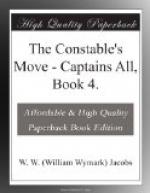The outskirts of the town were deserted and the houses in darkness. The clock of Tunwich church struck twelve, and the last stroke was just dying away as he turned a corner and ran almost into the arms of the man he had been trying to avoid.
“Halloa!” said Constable Evans, sharply. “Here, I want a word with you.”
Mr. Grummit quailed. “With me, sir?” he said, with involuntary respect.
“What have you been doing to my flowers?” demanded the other, hotly.
“Flowers?” repeated Mr. Grummit, as though the word were new to him. “Flowers? What flowers?”
“You know well enough,” retorted the constable. “You got over my fence last night and smashed all my flowers down.”
“You be careful wot you’re saying,” urged Mr. Grummit. “Why, I love flowers. You don’t mean to tell me that all them beautiful flowers wot you put in so careful ’as been spoiled?”
“You know all about it,” said the constable, choking. “I shall take out a summons against you for it.”
“Ho!” said Mr. Grummit. “And wot time do you say it was when I done it?”
“Never you mind the time,” said the other.
“Cos it’s important,” said Mr. Grummit.
“My wife’s brother—the one you’re so fond of—slept in my ’ouse last night. He was ill arf the night, pore chap; but, come to think of it, it’ll make ’im a good witness for my innocence.”
“If I wasn’t a policeman,” said Mr. Evans, speaking with great deliberation, “I’d take hold o’ you, Bob Grummit, and I’d give you the biggest hiding you’ve ever had in your life.”
“If you wasn’t a policeman,” said Mr. Grummit, yearningly, “I’d arf murder you.”
The two men eyed each other wistfully, loth to part.
“If I gave you what you deserve I should get into trouble,” said the constable.
“If I gave you a quarter of wot you ought to ’ave I should go to quod,” sighed Mr. Grummit.
“I wouldn’t put you there,” said the constable, earnestly; “I swear I wouldn’t.”
“Everything’s beautiful and quiet,” said Mr. Grummit, trembling with eagerness, “and I wouldn’t say a word to a soul. I’ll take my solemn davit I wouldn’t.”
“When I think o’ my garden—” began the constable. With a sudden movement he knocked off Mr. Grummit’s cap, and then, seizing him by the coat, began to hustle him along the road. In the twinkling of an eye they had closed.
Tunwich church chimed the half-hour as they finished, and Mr. Grummit, forgetting his own injuries, stood smiling at the wreck before him. The constable’s helmet had been smashed and trodden on; his uniform was torn and covered with blood and dirt, and his good looks marred for a fortnight at least. He stooped with a groan, and, recovering his helmet, tried mechanically to punch it into shape. He stuck the battered relic on his head, and Mr. Grummit fell back—awed, despite himself.




